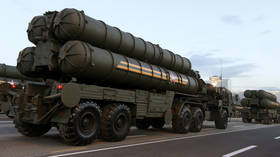The Chaos Guru : What’s So Exceptional About The US That It Can Tell New Delhi What Arms To Buy To Defend Itself ?

by Ashish Shukla
I was seven when the US sent its Seventh Fleet to the Bay of Bengal to scare India during the 1971 Indo-Pak War. Yoday it’s making a similar growl, of a financial kind, to freeze India from buying Russia’s S-400 missile system.
The State Department has warned India of economic sanctions under CAATSA (Countering America’s Adversaries Through Sanctions Act ) were it to go ahead with its S-400 acquisition, which India’s military has eyed so longingly for so long.
The US appears no wiser to the snub which New Delhi had delivered to secretary of state Mike Pompeo on the same matter six months ago.
The United States might think it’s indispensable enough to wag a finger at India, but it’s no better than grand-standing by a fading superpower which thinks the world is still its oyster and its ‘friends’ are no better than courtiers in attendance.
India doesn’t need to flip the history pages much to know how the United States has stood down its friends over the centuries.
From the day it was born in 1776 when it roped in and then dumped indigenous Delaware Indians in its war against the colonialist British, to the modern times when the likes of Ferdinand Marcos (Philippines), Manual Noriega (Panama), Saddam Hussein (Iraq), Muammar Gadaffi etc. come flashing to mind, used and then disposed-of, the United States hasn’t been an abiding friend with anyone.
Sure, it has a strategic Anglo-Saxon ‘5-Eyes’ brotherhood with UK, Canada, Australia and New Zealand, and Mexico is always secure, but the United States, by temperament, prefers client-states or vassals. Also, there’s no Soviet Union for them to over-extend themselves about, in pursuit of a Global Liberal Order.
It is now disengaging itself from the world theatre and be it NATO, Turkey, Japan, Israel or Saudi Arabia or the Kurds, all feel abandoned by their big brother from time to time. Remember the drone attack on Aramco when Saudis looked askance to the US and got nothing in return?
The Indo-Pacific And The Great Game
Thus India not only has the historical precedent to judge how convenient the United States is as an ally but it also has the chutzpah to know of its own relevance in the Indo-Pacific and the abiding interest this holds for the United States. Since 2016, the Council on Foreign Relations, which reflects US foreign policy, rates India as one of the most important pieces in its global jigsaw.
That’s not to say India doesn’t rely on the United States for its multiple needs, not least for its secure borders. Its overall trade with the United States was worth $84 billion in 2018. It also has a defence logistics sharing pact –the Agreement on Reciprocal Logistics Support (ARLS)– with the United States.
But Russia and S-400 technology are another thing. India signed a $5 billion deal with Russia in 2018 to buy five systems of this missile, whose capability has NATO in a fluster. India signed this deal last year even as the US sanctions against Russia were in place. The S-400 system can shoot four different missile types, forming a near impassable interlocking grid of missiles.
These missiles can’t be electronically jammed and their range could take care of almost 40,000-feet-high threats in the air. It’s an invaluable buy.
Besides, India has for decades been buying its arsenal from Russia and the fresh buys thus don’t usually have compatibility issues. Not only are the US arms more expensive, but it’s also not as willing to sell its advanced weapons to India as Russia is. Russia also is an important natural gas provider for India’s monstrous energy needs.
US And Its Catch-22 Dilemma
When the first system of S-400 is delivered to India this year –all are slated to be provided by 2024– it could be that the United States might enforce a few economic sanctions. After all, it did end India’s special trade privileges last year in a bid to force New Delhi’s hands in importing more goods.
But this would be no better than a slap on the wrist. A hard measure could actually come back to bite the United States, for it could halt its own major arms supplies to India, including prime weapons such as the F-35 fighter jet, which it has been hard-selling to India for some time now.
Instead of threatening India from the assumed position of an indispensable ally, it would help the United States to work out the tariff dispute –a miffed US president Donald Trump calls India “tariff king– and keep its Indian friends in good humour.
India is too important to be sacrificed in haste, certainly not with the empty rhetoric of a ban in case the S-400 missile is acquired by India. The United States has no option but to keep the pretence going of being an ‘ally’ with India.




